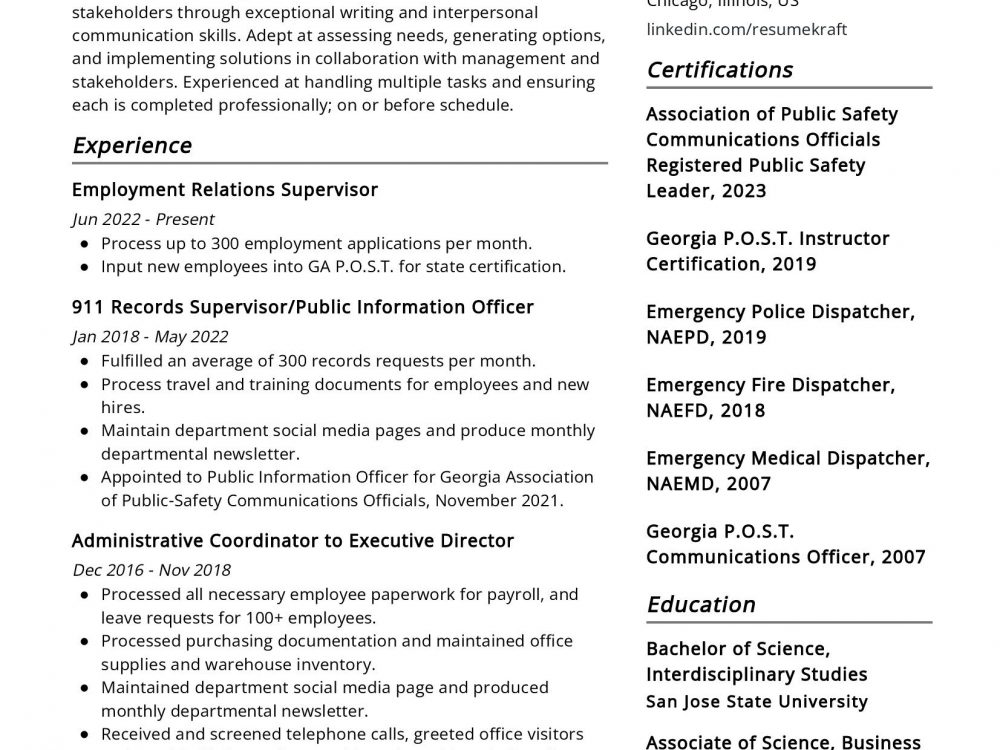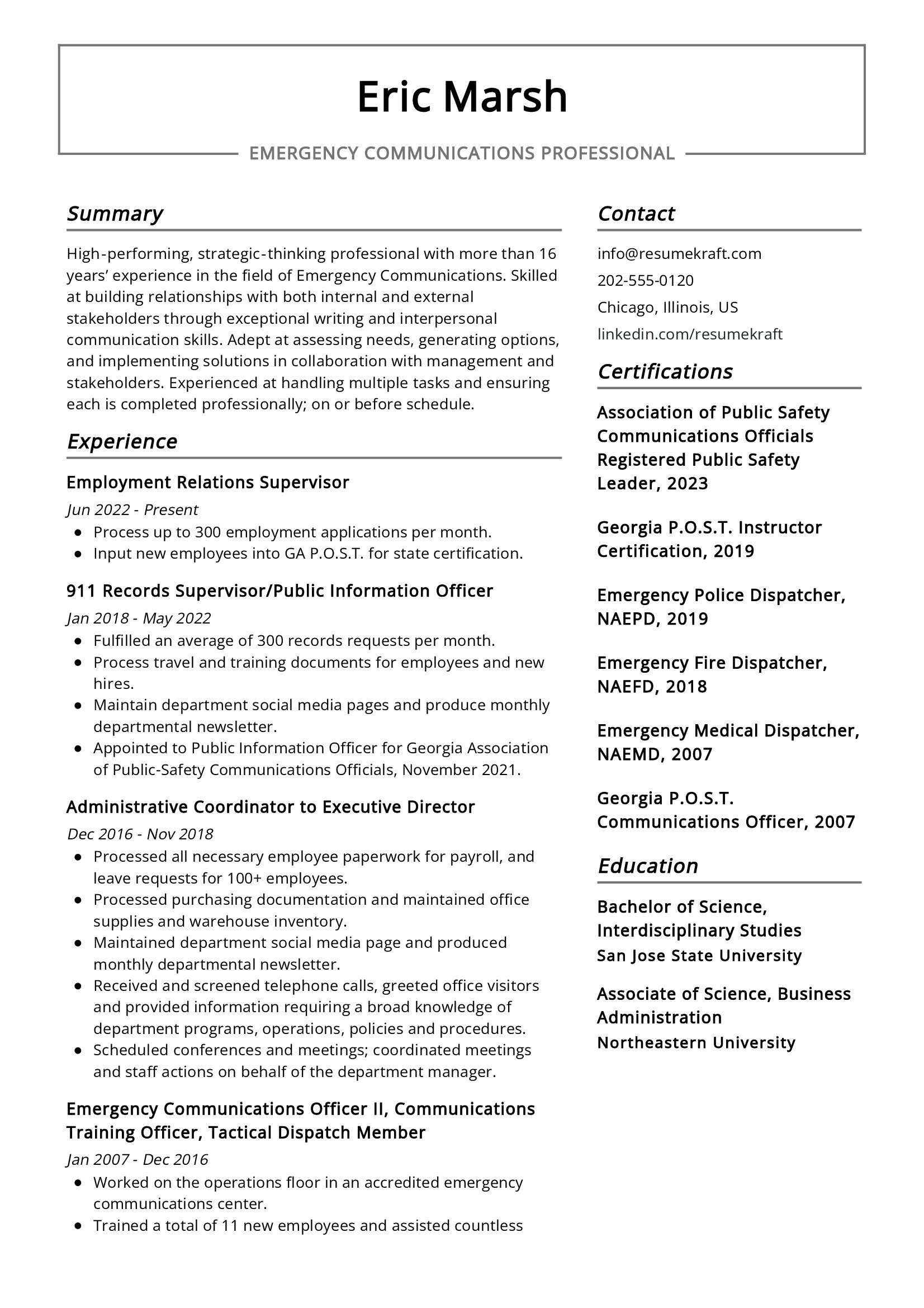Sure, here’s an SEO article for the job title “Emergency Communications Professional” following the provided outline and HTML Markdown structure:
—
Understanding the Vital Role of an Emergency Communications Professional
Emergency situations can happen at any moment, and when they do, effective communication becomes a lifeline. This is where an Emergency Communications Professional steps in, playing a critical role in ensuring that information flows seamlessly during crises. In this comprehensive guide, we will delve deep into the multifaceted world of Emergency Communications Professionals, exploring their responsibilities, qualifications, and the skills necessary for success in this vital profession.
What Does an Emergency Communications Professional Do?
An Emergency Communications Professional is the calm voice in the chaos, the one who coordinates and relays crucial information during emergencies. Their responsibilities encompass a wide range of tasks:
- Emergency Dispatch: They receive and prioritize emergency calls, dispatching the appropriate response teams swiftly.
- Resource Coordination: They ensure that the right resources, such as ambulances, police, or fire services, are sent to the scene.
- Information Dissemination: They provide real-time updates to responders, keeping them informed about changing situations.
- Public Communication: They may also communicate with the public, offering guidance during crises and reassuring them.
- Documentation: They maintain detailed records of all communication and actions taken during an emergency for future reference.
It’s a role that demands unwavering composure and the ability to make split-second decisions that can save lives.
Qualifications and Education for Emergency Communications Professionals
Stepping into the shoes of an Emergency Communications Professional requires meeting specific qualifications:
- High School Diploma: Most positions require a high school diploma or equivalent as a minimum educational requirement.
- Dispatcher Training: Many professionals undergo specialized dispatcher training programs to learn emergency protocols, call-handling techniques, and communication skills.
- State Certification: Depending on the jurisdiction, Emergency Communications Professionals may need to obtain state-specific certifications.
- On-the-Job Experience: Practical experience in a related role, such as call center work or public safety, can be beneficial.
While formal education is essential, practical experience and the ability to remain composed under pressure are equally crucial.
Essential Skills for Success
Being an effective Emergency Communications Professional requires a diverse set of skills:
Communication Skills: Clear and concise communication is paramount, as Emergency Communications Professionals must relay information accurately and quickly.
Stress Management: The ability to handle high-pressure situations with composure is vital, as emotions can run high during emergencies.
Empathy: Showing empathy and compassion when dealing with distressed callers can make a significant difference in calming them down.
Multi-Tasking: Emergency situations often involve juggling multiple tasks, such as answering calls, dispatching units, and documenting information simultaneously.
Technical Proficiency: Familiarity with computer-aided dispatch systems and communication equipment is essential.
Geographical Knowledge: A good understanding of local geography aids in dispatching responders accurately.
Teamwork: Emergency Communications Professionals work closely with first responders, so teamwork is crucial for a seamless operation.
Mastering these skills ensures that Emergency Communications Professionals can effectively coordinate responses to various types of emergencies, from medical crises to natural disasters.
Sample Resume for an Emergency Communications Professional
Your resume is your gateway to landing a job as an Emergency Communications Professional. Here are some tips to create a compelling resume:
- Objective Statement: Start with a clear objective statement that highlights your passion for public safety and your commitment to effective communication during emergencies.
- Work Experience: Detail your experience in a chronological order, emphasizing your roles in emergency dispatch, call handling, and any certifications or training you’ve received.
- Skills Section: Highlight your communication, stress management, and technical skills in a dedicated section.
- Education: Mention your educational background and any relevant certifications or courses you’ve completed.
- Achievements: Include any specific achievements or commendations you’ve received for your performance as an Emergency Communications Professional.
Your resume should paint a picture of your qualifications and your dedication to ensuring effective communication during emergencies.
Key Takeaways for Aspiring Emergency Communications Professionals
As you embark on your journey toward becoming an Emergency Communications Professional, keep these key takeaways in mind:
- Effective communication and stress management are the cornerstones of success in this profession.
- Continuous learning and training are essential to stay updated on emergency protocols and technologies.
- Empathy and compassion can make a significant difference in how you handle distressed callers.
- Teamwork is crucial, as you’ll be working closely with first responders to ensure a coordinated response.
Remember, your role as an Emergency Communications Professional is pivotal in saving lives and ensuring public safety.
Are you ready to embark on this rewarding career? Feel free to explore our AI Resume Builder to craft a standout application and prepare for your job interview as an Emergency Communications Professional.


